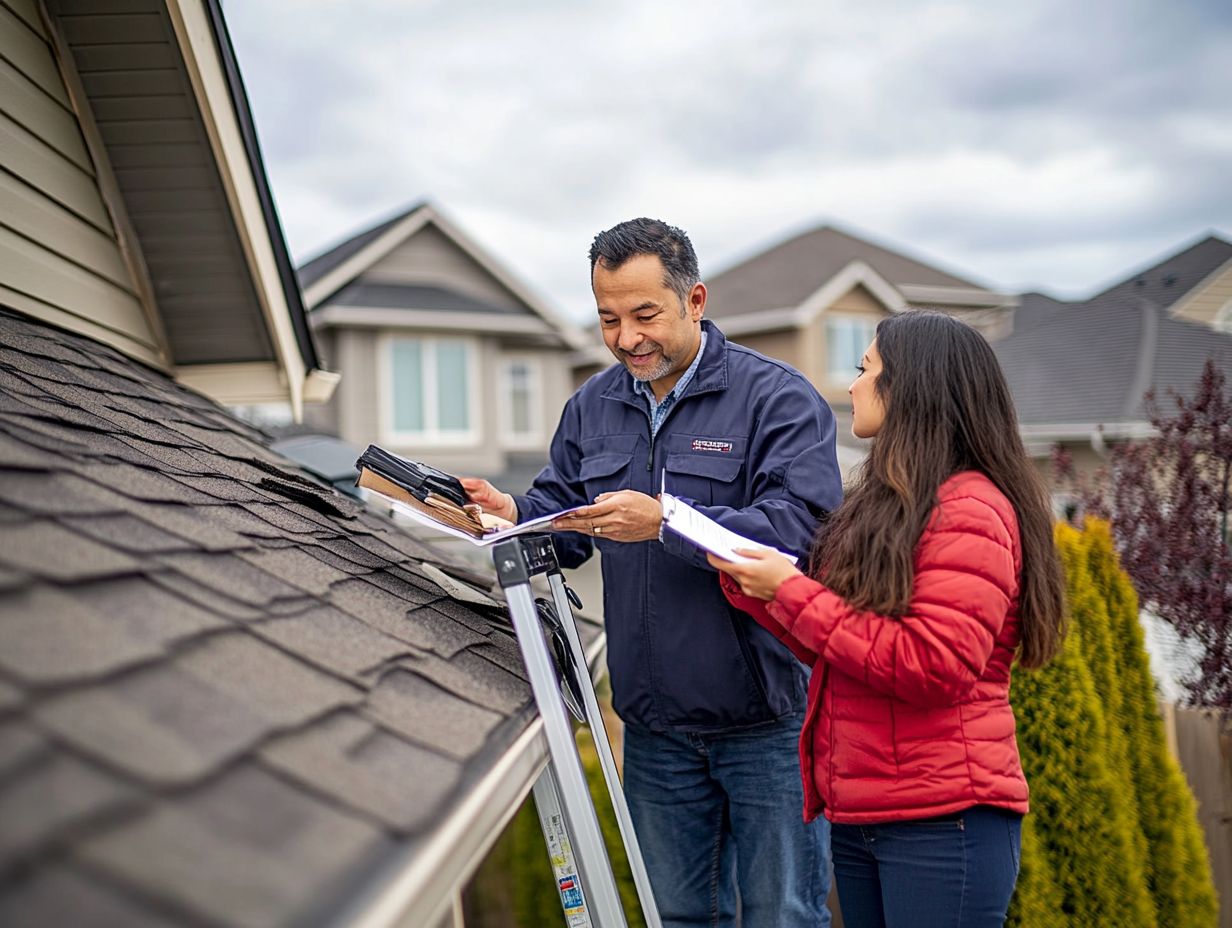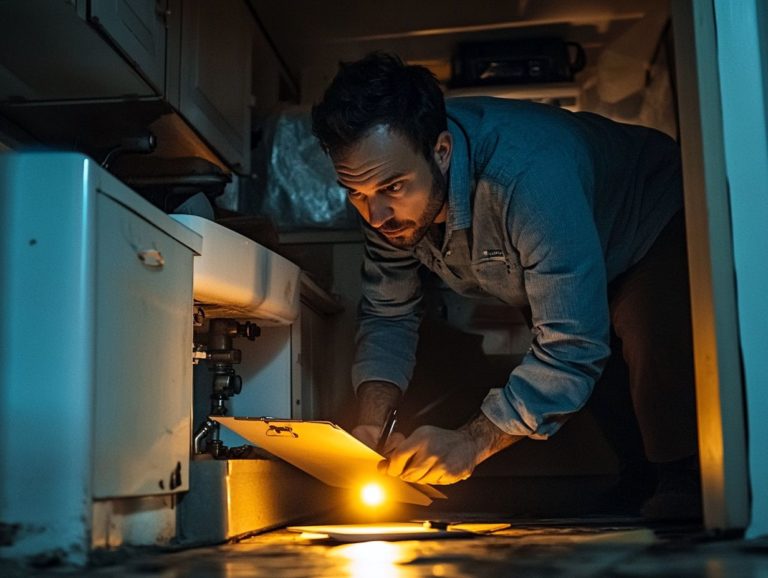Understanding the Home Inspection Process for Buyers
Buying a home is one of the most significant decisions you will ever make. Ensuring that your investment is sound is absolutely crucial. A home inspection serves as your safety net against potential pitfalls, providing you with peace of mind.
This article delves into what a home inspection truly entails. It highlights its importance for buyers like you. You will discover what to expect during the inspection process, from identifying common issues to selecting the right inspector and negotiating necessary repairs.
This guide encompasses every aspect to empower you on your home-buying journey, ensuring you navigate the process with confidence.
Contents
Key Takeaways:

- A home inspection is a thorough examination of a property’s condition that helps buyers identify potential problems and make informed decisions.
- It is crucial for buyers to conduct a home inspection to uncover any issues and negotiate repairs or renegotiate the sale price to avoid unexpected costs and ensure a safe, sound investment.
- During a home inspection, a professional inspector will assess the property’s structure, systems, and components. They provide buyers with a detailed report and the opportunity to address any concerns before finalizing the purchase.
What is a Home Inspection?
A home inspection is a careful evaluation of a property’s condition, carried out by a qualified home inspector. This essential process offers critical insights into the structural integrity, safety, and maintenance needs of a home.
For you as a home buyer, understanding the process can be very valuable. It reveals potential issues and defects that might not be apparent during a casual walkthrough. Often, the home inspection process is a necessary step before you secure a purchase agreement, and it can greatly affect your choices, especially if you are a first-time buyer navigating the intricate landscape of the real estate market.
What Does a Home Inspection Cover?
The purpose of a home inspection is to provide you with a comprehensive evaluation of a property’s condition before you finalize your purchase. Understanding the need for home inspections is vital, as it involves a careful assessment of various elements, including structural integrity, roofing, plumbing, and electrical systems.
By illuminating potential risks or hidden damages, it enables you to make informed decisions and prioritize necessary repairs. This insight helps you allocate your budget more effectively.
Ultimately, a home inspection is an essential tool in your real estate journey, providing insights into the property and helping you understand the home inspection timeline to ensure that you have a clear understanding of what you are investing in.
Why is a Home Inspection Important for Buyers?

A home inspection is vital for you as a buyer. It reveals potential risks tied to the property you are considering. Understanding the process of home inspections is a critical step that ensures you can make informed decisions before sealing the deal.
The inspection process uncovers defects that could affect both the safety and value of your future home, such as structural problems, lead paint, or radon. Act now to ensure your investment is sound!
Including an inspection contingency protects you financially and gives you negotiating power. You can leverage the inspection report to discuss necessary repairs or price adjustments, securing a better deal that truly reflects the property s condition.
Benefits and Potential Risks
The benefits of a home inspection significantly outweigh any potential risks. This examination shields you from unforeseen issues that could lead to financial strain.
By conducting a comprehensive examination of the property, you can uncover potential problems such as plumbing failures, structural weaknesses, or electrical hazards issues that might remain hidden during a casual walkthrough.
This proactive approach not only strengthens your negotiating position but also provides you with peace of mind, enabling you to move forward with your decision confidently.
On the flip side, skipping an inspection could lead to costly repairs that could have been easily addressed before the purchase, highlighting the crucial role inspections play in securing a sound investment.
The Home Inspection Process
The home inspection process is a careful examination conducted by a certified home inspector. The inspector follows a structured checklist to cover all critical aspects of the property. To learn more about this important phase, check out what to expect during the home inspection, as the inspector examines the building’s structure, systems, and safety features, carefully documenting findings in an inspection report.
This report identifies any existing defects or maintenance needs. It serves as an essential resource for you as a home buyer, outlining the property s overall condition and highlighting areas requiring attention. Ultimately, this can influence your purchasing decision.
Step-by-Step Guide

The home inspection process can be simplified into a clear step-by-step guide that outlines what you can expect during your inspection.
- Start by scheduling the inspection; reach out to a qualified inspector and coordinate a date that works for both of you.
- Once the appointment is set, the next phase involves a careful walkthrough of the property. Here, the inspector will check critical areas such as the foundation, roof, plumbing, and electrical systems, looking for any potential issues.
- After the physical inspection is complete, you ll receive a comprehensive report detailing the findings, complete with photographs and recommendations for any necessary repairs.
This transparent documentation enables you to make informed decisions about your investment, ensuring you re well-equipped for this significant milestone in homeownership.
Common Issues Found During a Home Inspection
During a home inspection, you can uncover several common issues that might raise red flags for potential buyers.
Structural problems such as foundational cracks, water damage, and electrical faults are critical concerns. These issues not only pose safety risks but can also lead to expensive repairs down the line.
By recognizing these defects during the inspection, you gain valuable insight into the property’s overall condition, enabling you to make informed choices before committing to your purchase agreement.
Identifying Red Flags
Identifying red flags during a home inspection is essential for you as a home buyer, as it brings potential issues to light that could impact your investment.
For example, spotting signs of water damage, such as stains on ceilings or walls, might signal leaks that could lead to costly repairs if you don’t act quickly.
Sellers can be crafty, sometimes disguising electrical problems with a fresh coat of paint. Flickering lights or overloaded circuits may indicate deeper issues that could jeopardize safety.
You should also be cautious of mold, especially in basements or attics, since it poses health risks and can also be expensive to remediate.
By recognizing these red flags early on, you empower yourself to negotiate repairs or even rethink your purchase, ultimately protecting your financial well-being.
How to Choose a Home Inspector

Choosing a qualified home inspector is essential for a thorough evaluation of your potential property. Before making your decision, consider several important factors.
- Start by assessing the inspector s qualifications and training, experience, and reputation.
- Consider the cost of the inspection and the comprehensiveness of their checklist.
Engaging a trusted real estate agent for recommendations can further enhance your understanding, especially regarding the importance of home inspections. This ensures that you, as a first-time buyer, connect with an inspector who meets your specific needs and adheres to industry standards established by organizations like the American Society of Home Inspectors.
Start your home buying journey with confidence by choosing the right inspector!
Factors to Consider
When choosing a home inspector, keep a few key factors in mind. These will help ensure a thorough evaluation.
Experience matters. Inspectors with years in the field can spot issues that newer inspectors might miss.
Certifications are important too. Inspectors accredited by recognized organizations show a commitment to quality.
Reading reviews from previous clients can give you insights into the inspector s reliability.
Evaluating these elements can lead to a smoother home buying process and help you avoid unexpected expenses.
What to Expect from a Home Inspection Report
A home inspection report is a detailed report that captures the findings of the home inspector. It provides valuable insights into the property’s condition, highlighting any defects uncovered during the assessment.
This report helps you make smart choices about your investment.
Understanding the Results
Understanding the results of a home inspection report is essential for buyers to make informed decisions about their potential investment. A comprehensive guide on understanding the home inspection process for buyers can be incredibly helpful in this regard.
By analyzing each section of the report, you can assess the property’s overall health and identify areas that may need immediate attention or could lead to costly repairs.
The findings typically include a breakdown of various components such as the roof, plumbing, electrical systems, and structural integrity. This offers insights into both the current condition of the home and the necessary maintenance to ensure its longevity.
Recognizing reported defects allows you to negotiate repairs and save money before it’s too late!
Negotiating Repairs and Renegotiating the Sale Price
Upon receiving the home inspection report, you will face the important task of negotiating necessary repairs and possibly renegotiating the sale price based on the findings.
Strategies for Addressing Issues
Negotiation strategies are essential for tackling issues found during your home inspection. These strategies help you leverage your findings effectively.
Use the inspection report as a negotiating tool. This lets you present concrete evidence to sellers, emphasizing the urgent need for repairs that could affect the property s value.
Propose clear timelines for repairs. This streamlines negotiations and shows your seriousness and organizational skills.
Consider a price reduction based on inspection findings. This not only accounts for necessary repairs but also creates a fair basis for your deal.
With these tactics, you can approach negotiations with confidence. Protect your interests effectively!
Frequently Asked Questions
What is a home inspection and why is it important for buyers?
A home inspection is a thorough evaluation of a property’s condition by a professional inspector. Understanding the home inspection report helps buyers uncover potential issues that may not be visible during a regular viewing.
Who is responsible for arranging a home inspection?
Typically, it is the buyer’s responsibility to arrange and pay for the inspection. Some sellers may get a pre-listing inspection done for potential buyers.
What is included in a home inspection?
A home inspection includes checking the property’s structure, foundation, plumbing, electrical systems, HVAC, roof, and other major components. Inspectors also look for visible issues like water damage or pests.
How long does a home inspection usually take?
Home inspections can vary in length based on property size and condition. On average, they take between 2 to 4 hours.
Can buyers attend the home inspection?
Yes, buyers are highly encouraged to attend the inspection. It allows them to ask questions and better understand the inspection report.
What happens if issues are found during the home inspection?
If issues arise, buyers can negotiate with sellers for repairs or a price reduction. It’s crucial to review the inspection report carefully and consult a real estate professional before making decisions.






